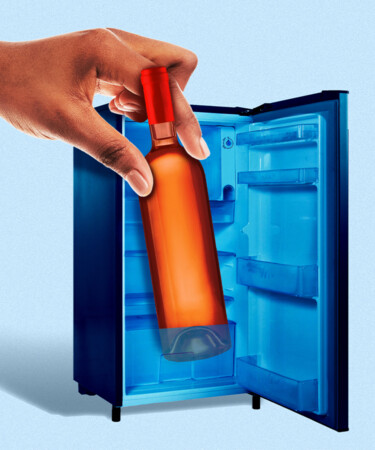A quick search for how to store wine at home will yield a few general rules: Store bottles on their side, in a cool place, and away from natural light. Most pros agree that the best place to keep unopened bottles is a wine fridge, which safely regulates wine’s temperature in a space that is protected from sunlight. But not every oenophile has a wine fridge of their own, which begs the question: Can wine be stored in a standard refrigerator?
VinePair chatted with Paula de Pano, sommelier and owner of Chapel Hill, N.C.’s Rocks + Acid Wine Shop, who weighs in on the topic.
When aging wine, it’s important to protect it from bright light, as over-exposure can lead to adverse chemical reactions and degradation. As most refrigerators use brighter standard light bulbs as opposed to the soft LED lights found in wine fridges, de Pano avoids storing age-worthy wines in her kitchen fridge.
For long-term storage, wines should be kept at a constant temperature that’s cool but not cold; an ideal temperature range is somewhere between 45 and 60 degrees. While a standard icebox may seem like a good home for your wine, most refrigerators will over-chill your bottles — ranging in temperature from 35 to 38 degrees.
Humidity is another factor to consider when storing vino. “Wines with natural corks are more easily exposed to air when stored in the fridge, as the corks can dry out and begin to shrink,” de Pano says. This loosens the seal on the bottle, further increasing the chance for oxidation to occur. Ideally, a wine storage area should have an average humidity level of around 70 percent. Humidity is not as important when it comes to food storage, so standard refrigerators tend to have much lower levels (around 30 percent).
If you want to store wine in the refrigerator, de Pano suggests only doing so for bottles that you plan on drinking within the week. “Storing wines that you plan on consuming immediately lessens the risk of cork shrinkage occurring, since the time spent in the fridge is minimal,” she says.
So, is the refrigerator the best option for storing wine? Certainly not. “Wine storage is simple — keep it stable both in temperature and movement,” de Pano says. “This means away from temperature swings, direct light, and vibrations.”
